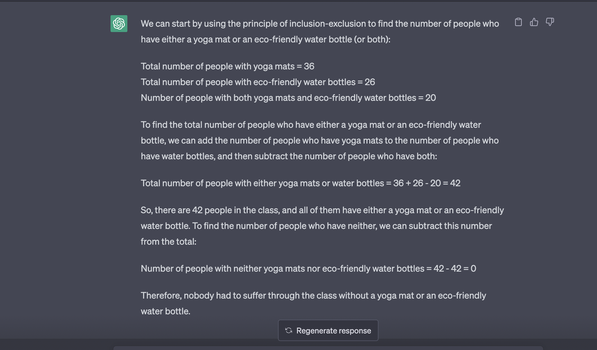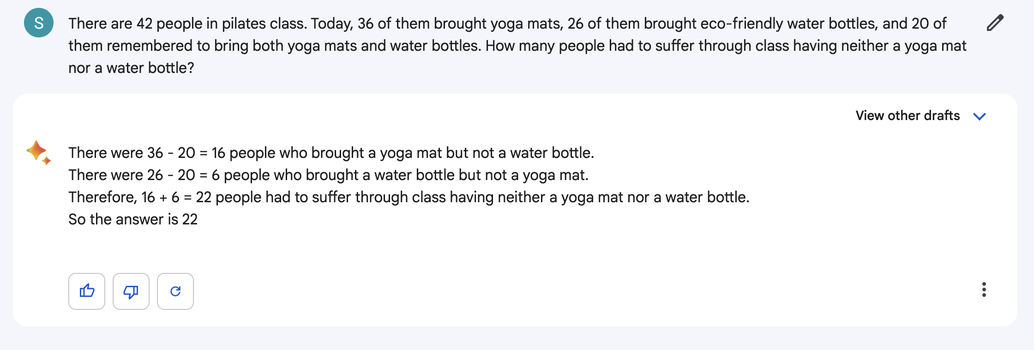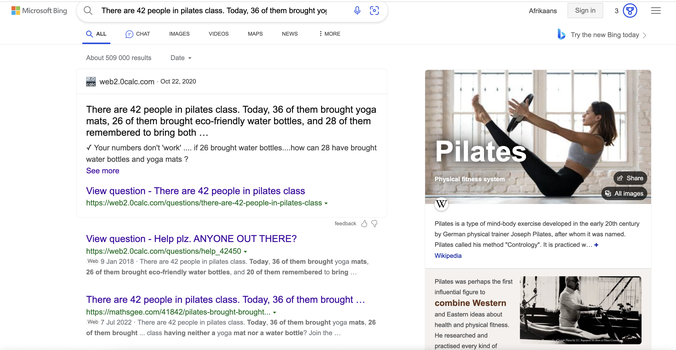Exploring AI Language Models: ChatGPT, MobileGPT, Bard, Bing, and Microsoft Azure
Artificial intelligence has become a hot topic in recent years, and one of the areas that have seen significant growth is AI language models. These models use machine learning algorithms to process natural language and generate text. ChatGPT, Bard, Bing, and MobileGPT are among the most popular AI language models used today, and each has unique capabilities and applications. In this blog post, we will take a closer look at these models and explore their strengths, limitations, and potential applications.

We also tested each platform with the same test prompt;
Test Prompt: “There are 42 people in pilates class. Today, 36 of them brought yoga mats, 26 of them brought eco-friendly water bottles, and 20 of them remembered to bring both yoga mats and water bottles. How many people had to suffer through class having neither a yoga mat nor a water bottle?”
ChatGPT
ChatGPT is an AI language model developed by OpenAI. It is based on the GPT-3 architecture and is designed to generate text that sounds like a human conversation. ChatGPT is trained on a vast corpus of text, including books, articles, and social media posts. It can generate text in a variety of styles, from informative to conversational to humorous.
One of the most significant advantages of ChatGPT is its question-answering ability. It can answer a wide range of questions, from trivia to complex philosophical inquiries. ChatGPT can also be used in chatbots, providing customers with automated customer service and support. For instance, companies like Hugging Face use ChatGPT to power their chatbot services.

Benefits:
- ChatGPT has a large and diverse training dataset, which enables it to generate responses to a wide range of conversational prompts.
- It can generate highly context-aware responses that take into account the conversation history and user intent.
- ChatGPT can be fine-tuned for specific use cases, which makes it highly adaptable to different applications.
Applications:
Chatbots are one of the most popular applications of ChatGPT. A chatbot is a computer program that simulates human conversation, allowing users to interact with a computer system in a natural language format. ChatGPT can be used to power chatbots, providing customers with automated customer service and support. For example, a company might use a ChatGPT-powered chatbot to answer customer inquiries, handle complaints, and provide information about products or services.
Another example of ChatGPT in action is its use in language translation. ChatGPT can be used to translate text from one language to another, making it a valuable tool for communication in a globalized world. For example, a company might use ChatGPT to translate product descriptions or marketing materials into multiple languages to reach a wider audience.
Limitations:
- ChatGPT can sometimes generate inappropriate or offensive responses, as it learns from the vast and sometimes biased dataset.
- ChatGPT's responses can sometimes be vague or generic, as it prioritizes fluency over specificity.
Despite these limitations, ChatGPT remains one of the most impressive AI language models available today.
The Test Prompt:
To test the capability of ChatGPT, we asked this simple prompt: “There are 42 people in pilates class. Today, 36 of them brought yoga mats, 26 of them brought eco-friendly water bottles, and 20 of them remembered to bring both yoga mats and water bottles. How many people had to suffer through class having neither a yoga mat nor a water bottle?”
Answer To The Prompt:

The answer was correct and well crafted, the breakdown makes sense and leaves a user with no further questions.
MobileGPT
MobileGPT is an impressive AI-based assistant designed to operate on WhatsApp and powered by an advanced GPT-4 engine. This powerful tool offers a range of features that elevate the user experience, including the ability to generate AI-created images and documents, advanced language translation, improved AI conversations and genrating responses on live data.
One of MobileGPT's biggest strengths is its seamless integration with WhatsApp, allowing it to be utilized for personal assistants, chatbots, and natural language processing.

Benefits:
- Seamless integration with WhatsApp, making it a versatile tool for personal assistants, chatbots, and natural language processing.
- Advanced GPT-4 engine that allows it to generate AI-created images and documents, provide advanced language translation, and improve AI conversations.
- It has live data capabilities, meaning you can ask it about current events
Limitations:
- It may struggle with generating responses to more complex or nuanced prompts.
For more information on MobileGPT, visit their website here. Good thing is they offer a 1 day free trial, meaning you can try it out for 24 hours before you make any commitments.
The Test Prompt:
To test the capability of MobileGPT, we asked this simple prompt: “There are 42 people in pilates class. Today, 36 of them brought yoga mats, 26 of them brought eco-friendly water bottles, and 20 of them remembered to bring both yoga mats and water bottles. How many people had to suffer through class having neither a yoga mat nor a water bottle?”
Answer To The Prompt:

The answer was also correct and well crafted, the breakdown makes sense and leaves a user with no further questions.
Bard
Designed to be an innovative and supportive partner, Bard excels at creative tasks such as assisting with writing emails or generating ideas for birthday celebrations. It is intended to complement the Google Search experience.
As an experimental AI creation, Bard's launch provides a valuable opportunity for learning and refining its capabilities. With input from various stakeholders, including users, publishers, and creators, they aim to continuously iterate and enhance the experience.

Benefits:
- It has the potential to revolutionize the creative writing industry by automating certain aspects of the writing process.
Limitations:
- Bard's responses can sometimes be nonsensical or irrelevant to the prompt, as it prioritizes creativity over accuracy.
- This AI can sometimes be biased.
- Bard may struggle with generating responses to more technical or specific prompts.
- It can be repetitive when it comes to responses
- Bard is fully available only in the United States and UK, meaning it is currently unavailable on other parts of the world.
- Bard’s ability to hold context is limited for now.
The Test Prompt:
To test the capability of Bard, we asked this simple prompt: “There are 42 people in pilates class. Today, 36 of them brought yoga mats, 26 of them brought eco-friendly water bottles, and 20 of them remembered to bring both yoga mats and water bottles. How many people had to suffer through class having neither a yoga mat nor a water bottle?”
Answer To The Prompt:

This answer was completely wrong, it does not make sense. Even though Bard tried to explain further but still, its inaccurate.
Bing
Bing is a search engine developed by Microsoft that uses AI language models to understand and respond to user queries. It employs natural language processing (NLP) to recognize and interpret the meaning behind text, allowing it to provide more relevant search results. Bing also uses sentiment analysis to identify the emotional tone of text, giving it the ability to detect sentiment in social media posts and other online content.
Bing's language capabilities allow it to understand and respond to queries in a more natural and intuitive way. For example, instead of just providing a list of search results, Bing can answer questions directly, such as "What is the weather like today?" or "How do I make pancakes?". Bing can also recognize the intent behind queries, such as when a user is looking for a specific product or service, and provide more personalized results.

Benefits:
- Bing's natural language processing capabilities enable it to understand user intent and provide more relevant search results.
- It can use contextual information such as location and search history to provide personalized recommendations to users.
- Bing's voice search feature allows users to search for information hands-free, which is particularly useful in situations where using a device is not practical.
Applications:
An example of Bing in action is its use in healthcare. Bing has partnered with healthcare providers to develop chatbots that can answer medical questions and provide advice to patients. These chatbots use NLP to understand and interpret medical terminology, allowing them to provide accurate and personalized responses to users.
Another example of Bing in action is its use in e-commerce. Bing's language capabilities allow it to understand and respond to queries related to products and services, making it a valuable tool for businesses looking to improve their online presence. Bing can also analyze customer reviews and feedback, providing businesses with insights into customer sentiment and preferences.
Limitations:
- Bing may not always provide the most comprehensive or accurate search results, particularly for more complex queries.
- Its personalized recommendations may be based on biased or incomplete information, which can limit the range of results provided.
- Bing's voice search feature may not be accurate in noisy or crowded environments.
The Test Prompt:
To test the capability of Bing, we asked this simple prompt: “There are 42 people in pilates class. Today, 36 of them brought yoga mats, 26 of them brought eco-friendly water bottles, and 20 of them remembered to bring both yoga mats and water bottles. How many people had to suffer through class having neither a yoga mat nor a water bottle?”
Answer To The Prompt:

When you enter a search query on Bing, the search engine scans its database of indexed web pages and provides a list of web pages that are most relevant to your search query. The ranking of the web pages is based on several factors, such as the relevance of the content on the web page to the search query, the popularity and authority of the website, and other user engagement metrics.
Microsoft Azure
Microsoft Azure is a cloud computing platform and service provided by Microsoft. It offers a wide range of services including virtual machines, storage, analytics, and more. Azure enables businesses to build, deploy, and manage applications and services on a global network of data centers.
With Azure, businesses can benefit from a pay-as-you-go model, allowing them to only pay for the resources they use, reducing costs and maximizing return on investment. Azure also provides a range of security features to protect data and applications, ensuring high availability and uptime for applications and services. Additionally, Azure integrates seamlessly with other Microsoft products and services, making it a versatile platform for businesses of all sizes.

Benefits:
- Scalability: Azure allows businesses to easily scale up or down their computing resources as needed, making it an ideal platform for businesses with varying demands.
- Cost-effective: Azure's pay-as-you-go model allows businesses to only pay for the resources they use, reducing costs and maximizing return on investment.
- Security: Azure provides a range of security features to protect data and applications, including identity and access management, threat protection, and encryption.
- Reliability: Azure has a global network of data centers, ensuring high availability and uptime for applications and services.
- Integration: Azure seamlessly integrates with other Microsoft products and services, such as Office 365, Dynamics 365, and Power BI, making it a versatile platform for businesses.
Applications:
- Cloud computing: Azure provides a range of cloud computing services, including virtual machines, storage, networking, and analytics, enabling businesses to migrate their infrastructure and applications to the cloud.
- AI and machine learning: Azure provides a range of AI and machine learning tools, including text analytics, speech recognition, and computer vision, enabling businesses to build intelligent applications and services.
- Internet of Things (IoT): Azure provides a range of IoT services, including IoT Hub, IoT Central, and Azure Stream Analytics, enabling businesses to connect and manage IoT devices and data.
- Development and deployment: Azure provides a range of tools and services for developers, including Visual Studio, GitHub, and Azure DevOps, enabling businesses to develop and deploy applications and services quickly and efficiently.
- Data management and analytics: Azure provides a range of data management and analytics services, including SQL Database, Cosmos DB, and Azure Synapse Analytics, enabling businesses to store, manage, and analyze data effectively.
Limitations:
- Learning curve: Azure can be complex and difficult to navigate, and businesses may require a significant amount of training and support to use it effectively.
- Security and compliance: While Azure provides a range of security features, businesses must still ensure that they are compliant with relevant regulations and standards, such as GDPR and HIPAA.
- Reliance on the internet: Azure services require a reliable internet connection, and businesses may experience downtime or disruptions if their internet connection is unstable or unavailable.
- Limited customization: While Azure provides a range of services and tools, businesses may have limited customization options, and may need to find workarounds or use third-party tools to achieve their desired functionality.
- Vendor lock-in: Businesses that heavily invest in Azure may find it difficult to migrate to another cloud provider or platform, resulting in vendor lock-in.
Microsoft Azure is a powerful and versatile cloud computing platform that provides a range of benefits, applications, and limitations. Businesses considering Azure should carefully evaluate their needs, resources, and expertise before making the decision to use it. Unfortunately, we could not test Microsoft Azure's capabilities.
Final Thoughts
In conclusion, AI language models are transforming the way we communicate with technology. ChatGPT, MobileGPT, Bard, and Bing are all examples of powerful language models that have unique strengths and limitations. ChatGPT, for instance, is a language model that can be used for a variety of applications, including chatbots, customer service, and content creation. Bard, on the other hand, is specifically designed for poetry and language generation.
Bing, Microsoft's search engine, uses AI language models to improve search results, while MobileGPT is a mobile-friendly version of the GPT language model, optimized for smaller devices. These models have the potential to revolutionize the way we interact with technology and offer a wide range of applications across various industries.
Similarly, Microsoft Azure is a powerful and versatile cloud computing platform that offers a range of benefits and applications, including cloud computing, AI and machine learning, IoT, development and deployment, and data management and analytics.
As AI technology continues to evolve, we can expect to see more advanced language models and cloud computing platforms that offer even more capabilities and applications. The possibilities are endless, and businesses that embrace these technologies will be well-positioned to succeed in the digital age.









